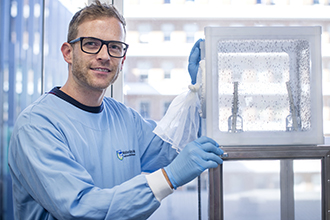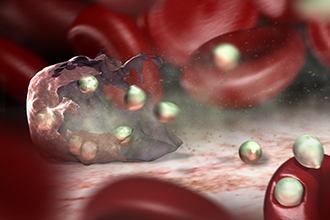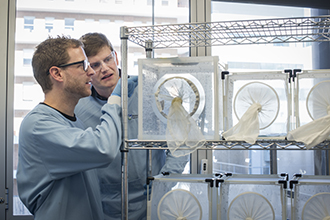Boddey JA, Frischknecht F. Interferoning with Plasmodium development in the liver. Cell Host & Microbe. 2025;33(4):10.1016/j.chom.2025.03.007
Zanghí G, Patel H, Smith JL, Camargo N, Bae Y, Hesping E, Boddey JA, Venugopal K, Marti M, Flannery EL, Chuenchob V, Fishbaugher ME, Mikolajczak SA, Roobsoong W, Sattabongkot J, Gupta P, Pazzagli L, Rezakhani N, Betz W, Hayes K, Goswami D, Vaughan AM, Kappe SHI. Genome-wide gene expression profiles throughout human malaria parasite liver stage development in humanized mice. Nature Microbiology. 2025;10(2):10.1038/s41564-024-01905-5
Wang L, Qu J, Harari O, Boddey JA, Wang Z, Linna-Kuosmanen S. The impact of multi-omics in medicine. Cell Reports Medicine. 2024;5(9):10.1016/j.xcrm.2024.101742
Angage D, Chmielewski J, Maddumage JC, Hesping E, Caiazzo S, Lai KH, Yeoh LM, Menassa J, Opi DH, Cairns C, Puthalakath H, Beeson JG, Kvansakul M, Boddey JA, Wilson DW, Anders RF, Foley M. A broadly cross-reactive i-body to AMA1 potently inhibits blood and liver stages of Plasmodium parasites. Nature Communications. 2024;15(1):10.1038/s41467-024-50770-7
Darif N-D, Ganter M, Dziekan JM, Kilian N, Brancucci N, Ng C, de Vries LE, Guttery D, Philip N, Boddey JA, Metwally NG, Okumu F, Kooij TWA, Absalon S, Bryant JM. BioMalPar XX: looking back on, and forward from, 20 years of malaria research. Trends in Parasitology. 2024;40(8):10.1016/j.pt.2024.06.012
McConville R, Krol JMM, Steel RWJ, O’Neill MT, Davey BK, Hodder AN, Nebl T, Cowman AF, Kneteman N, Boddey JA. Flp/FRT-mediated disruption of ptex150 and exp2 in Plasmodium falciparum sporozoites inhibits liver-stage development. Proceedings of the National Academy of Sciences of the United States of America. 2024;121(28):10.1073/pnas.2403442121
Hesping E, Boddey JA. Whole‐genome CRISPR screens to understand Apicomplexan–host interactions. Molecular Microbiology. 2024;121(4):10.1111/mmi.15221
Preston SP, Stutz MD, Allison CC, Nachbur U, Gouil Q, Tran BM, Duvivier V, Arandjelovic P, Cooney JP, Mackiewicz L, Meng Y, Schaefer J, Bader SM, Peng H, Valaydon Z, Rajasekaran P, Jennison C, Lopaticki S, Farrell A, Ryan M, Howell J, Croagh C, Karunakaran D, Schuster-Klein C, Murphy JM, Fifis T, Christophi C, Vincan E, Blewitt ME, Thompson A, Boddey JA, Doerflinger M, Pellegrini M. Epigenetic Silencing of RIPK3 in Hepatocytes Prevents MLKL-mediated Necroptosis From Contributing to Liver Pathologies. Gastroenterology. 2022;163(6):10.1053/j.gastro.2022.08.040
Clucas D, Bennett C, Steel R, Mellin R, Caiazzo S, Schaeper U, Boddey J, Ataide R, Pasricha S-R. Tmprss6 Depletion-Mediated Iron Deficiency Attenuates the Clinical Course of Plasmodium Berghei Infection in Mice. Blood. 2022;140(Supplement 1):10.1182/blood-2022-165823
de Lera Ruiz M, Favuzza P, Guo Z, Zhao L, Hu B, Lei Z, Zhan D, Murgolo N, Boyce CW, Vavrek M, Thompson J, Ngo A, Jarman KE, Robbins J, Boddey J, Sleebs BE, Lowes KN, Cowman AF, Olsen DB, McCauley JA. The Invention of WM382, a Highly Potent PMIX/X Dual Inhibitor toward the Treatment of Malaria. ACS Medicinal Chemistry Letters. 2022;13(11):10.1021/acsmedchemlett.2c00355






